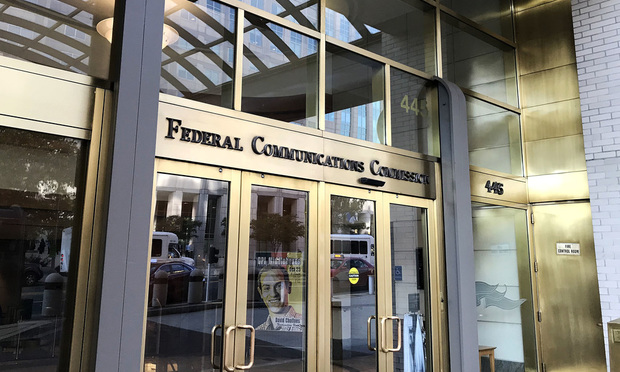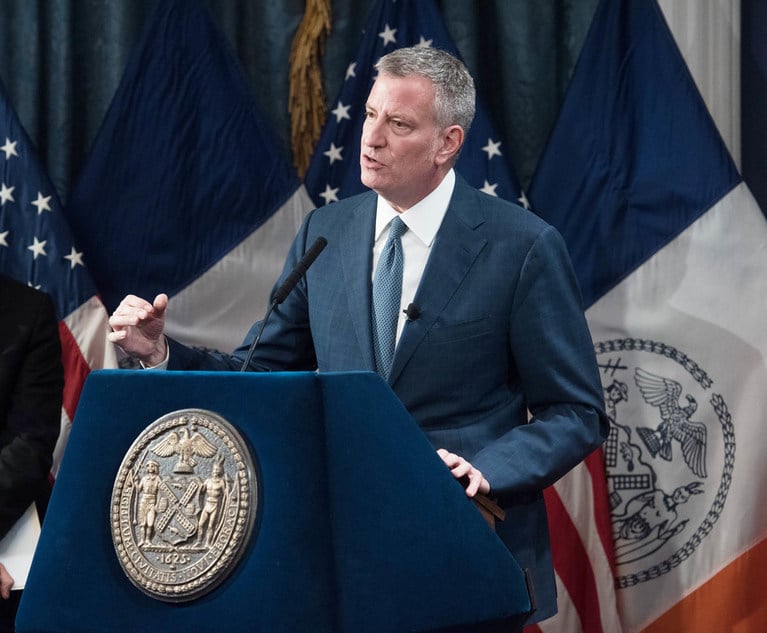Tech Companies, GCs Await Vote on Net Neutrality Rollback
If individual companies' general counsel are willing to step up and make their voices heard, they can help fight the net neutrality rollback, experts said.
December 14, 2017 at 11:39 AM
5 minute read
The original version of this story was published on Corporate Counsel
 FCC Building. Photo credit: Diego Radzinschi/ALM.
FCC Building. Photo credit: Diego Radzinschi/ALM.
The day has arrived for the Federal Communications Commission vote on its controversial plan to repeal net neutrality, an Obama-era regulation that requires internet service providers to treat all content equally without blocking or slowing down access to specific sites.
Tech companies such as Facebook and Netflix spoke out last month when the FCC announced it would move to reverse the 2015 Open Internet Order, expressing disappointment and concern.
On Nov. 21, CEO Michael Beckerman of the lobbying group the Internet Association, which counts some of the biggest tech companies as members, issued a statement saying the group “will continue our work to ensure net neutrality protections remain the law of the land,” but did not clarify how it would do so.
This sense of concern from tech could be channeled into a challenge to the net neutrality rollback in the courts, experts told Corporate Counsel, but legal action would probably come from industry groups, not individual companies. They also said that, if individual companies' general counsel are willing to step up and make their voices heard, they can make a world of difference.
The Case Against the Rollback
Some experts say that if the Internet Association and other net neutrality supporters chose to pursue legal action against the FCC, they'd have a decent case.
Jessica González, an in-house attorney at the pro-net neutrality nonprofit Free Press, says there are a number of grounds on which net neutrality supporters could sue, should the rollback pass.
“If the vote does move forward on Dec. 14, we will appeal that decision with the courts,” she said. ”We feel we have a strong case. There are procedural irregularities that raise serious concerns.”
She says that FCC Chairman Ajit Pai, who floated the rollback plan, hasn't produced enough factual reasoning for the proposed change, which doesn't comply with the Data Quality Act. The act states federal agencies must ensure the data and information they disseminate is ethical and high-quality.
Pai has partly justified repealing net neutrality by claiming that 2015 net neutrality regulations decreased investment in internet service providers. But González says this is simply not true. She pointed to research from Free Press that indicates there has actually been a boost in ISP investment.
She also said a repeal could violate the Administrative Procedures Act, which says a change in policy cannot be “arbitrary and capricious.” Legal teams could argue this in court if they can prove that there's strong public support for net neutrality and significant consumer harm should it be repealed, González explained.
Who Will Rise to the Challenge?
It's likely that pro-net neutrality companies will take legal action—though probably not on an individual basis, says one FCC and telecom legal expert who asked to remain anonymous due to considerations around their current job.
In the last battle for net neutrality, the expert said, a few companies, including Verizon, which fought against net neutrality, did file their own petitions. Verizon and other ISP companies could also take legal action if they are not satisfied with the new FCC regulations, as they've done since 2015.
“It doesn't make a lot of sense to file your own petition unless you have a side that is so unique that your needs have to be represented,” the FCC and telecom expert said. “Trade associations create an opportunity for sharing of the cost of litigation. It's a long process and can be many, many, many thousands of dollars.”
So GCs on a budget, even a large one, may be financially better off pooling resources for outside counsel. But that doesn't mean they shouldn't play an active role.
An active GC, who asked to remain anonymous to preserve work relationships, said in-house counsel can actually make all the difference in net neutrality cases—in a sea full of lobbyists, a passionate, present general counsel stands out.
“The GC is a big role,” the in-house legal leader said. “So if the GC goes to D.C. and talks to congressmen, that sends a much stronger signal, versus the telecom companies that have 400 lobbyists.”
The current general counsel pointed to a previous net neutrality case in which GCs helped move the needle. In 2015, Ari Shahdadi, then general counsel of Tumblr, helped spark a conversation and movement that in part led to the passing of the Open Communications Act. Shahdadi, who is now the senior vice president of business development at Buzzfeed, spoke personally with people in D.C. and called on Tumblr users to make their voices heard in government. Eventually, even former President Barack Obama got on board.
Shahdadi admits that for general counsel, especially those not wearing policy hats too, advocacy can be complicated. GCs' hands are tied, he said, if the company CEO doesn't want them publicly speaking against or for a policy.
But he also notes that with the Open Communications Act, the presence and persistence of himself and other non-lobbyists is what made the difference.
If companies are serious about wanting net neutrality to stay, corporate leaders need to do more than sign a vague statement letter from the Internet Association, he said, they need to speak out.
This content has been archived. It is available through our partners, LexisNexis® and Bloomberg Law.
To view this content, please continue to their sites.
Not a Lexis Subscriber?
Subscribe Now
Not a Bloomberg Law Subscriber?
Subscribe Now
NOT FOR REPRINT
© 2025 ALM Global, LLC, All Rights Reserved. Request academic re-use from www.copyright.com. All other uses, submit a request to [email protected]. For more information visit Asset & Logo Licensing.
You Might Like
View All
Snapshot Judgement: The Case Against Illustrated Indictments

Read the Document: DOJ Releases Ex-Special Counsel's Report Explaining Trump Prosecutions
3 minute read
Ex-NYC Mayor de Blasio Must Pay $475K Fine for NYPD’s Presidential Campaign Security
3 minute read
Alston & Bird Adds M&A, Private Equity Team From McDermott in New York
4 minute readTrending Stories
- 1High Court Rejects 'Heightened' Standard for Employers Defending FLSA Cases
- 2Case With 'Serious Consequences for Corporate Law' Heads to Texas Supreme Court
- 3Oil Co. Alleges Plot to Drive Away Competition in NYC's Liquid Fuel Market
- 4Takeaways From Day One of Pam Bondi’s Confirmation Hearing
- 5Greenberg Traurig, Holland & Knight Leaders Expect AI Investments to Jump in 2025
Who Got The Work
J. Brugh Lower of Gibbons has entered an appearance for industrial equipment supplier Devco Corporation in a pending trademark infringement lawsuit. The suit, accusing the defendant of selling knock-off Graco products, was filed Dec. 18 in New Jersey District Court by Rivkin Radler on behalf of Graco Inc. and Graco Minnesota. The case, assigned to U.S. District Judge Zahid N. Quraishi, is 3:24-cv-11294, Graco Inc. et al v. Devco Corporation.
Who Got The Work
Rebecca Maller-Stein and Kent A. Yalowitz of Arnold & Porter Kaye Scholer have entered their appearances for Hanaco Venture Capital and its executives, Lior Prosor and David Frankel, in a pending securities lawsuit. The action, filed on Dec. 24 in New York Southern District Court by Zell, Aron & Co. on behalf of Goldeneye Advisors, accuses the defendants of negligently and fraudulently managing the plaintiff's $1 million investment. The case, assigned to U.S. District Judge Vernon S. Broderick, is 1:24-cv-09918, Goldeneye Advisors, LLC v. Hanaco Venture Capital, Ltd. et al.
Who Got The Work
Attorneys from A&O Shearman has stepped in as defense counsel for Toronto-Dominion Bank and other defendants in a pending securities class action. The suit, filed Dec. 11 in New York Southern District Court by Bleichmar Fonti & Auld, accuses the defendants of concealing the bank's 'pervasive' deficiencies in regards to its compliance with the Bank Secrecy Act and the quality of its anti-money laundering controls. The case, assigned to U.S. District Judge Arun Subramanian, is 1:24-cv-09445, Gonzalez v. The Toronto-Dominion Bank et al.
Who Got The Work
Crown Castle International, a Pennsylvania company providing shared communications infrastructure, has turned to Luke D. Wolf of Gordon Rees Scully Mansukhani to fend off a pending breach-of-contract lawsuit. The court action, filed Nov. 25 in Michigan Eastern District Court by Hooper Hathaway PC on behalf of The Town Residences LLC, accuses Crown Castle of failing to transfer approximately $30,000 in utility payments from T-Mobile in breach of a roof-top lease and assignment agreement. The case, assigned to U.S. District Judge Susan K. Declercq, is 2:24-cv-13131, The Town Residences LLC v. T-Mobile US, Inc. et al.
Who Got The Work
Wilfred P. Coronato and Daniel M. Schwartz of McCarter & English have stepped in as defense counsel to Electrolux Home Products Inc. in a pending product liability lawsuit. The court action, filed Nov. 26 in New York Eastern District Court by Poulos Lopiccolo PC and Nagel Rice LLP on behalf of David Stern, alleges that the defendant's refrigerators’ drawers and shelving repeatedly break and fall apart within months after purchase. The case, assigned to U.S. District Judge Joan M. Azrack, is 2:24-cv-08204, Stern v. Electrolux Home Products, Inc.
Featured Firms
Law Offices of Gary Martin Hays & Associates, P.C.
(470) 294-1674
Law Offices of Mark E. Salomone
(857) 444-6468
Smith & Hassler
(713) 739-1250






